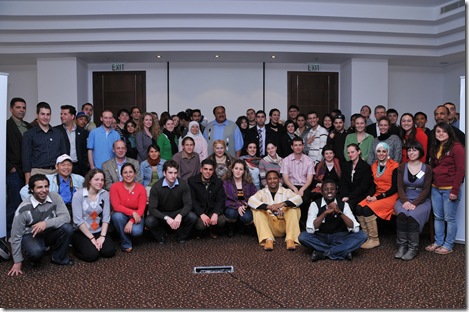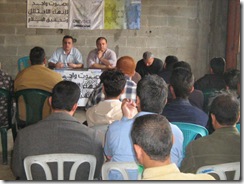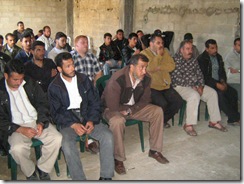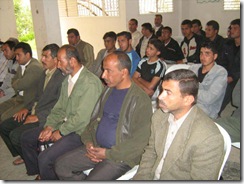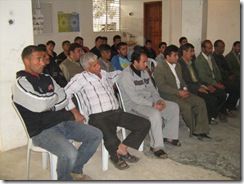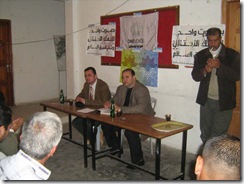Chuck Close
Published under Art, Innovation, Leadership, Life, New York City, United States Apr 13, 2008Ovation Cable TV had a special today on Chuck Close, an American artist/painter whose work is extraordinary. Take a look on google images and in this website. No less extraordinary is his background and the challenges he overcame along his life, never letting setbacks keep him down, always surmounting tragedies to come out stronger. This article does a good job describing his life. He is not just an artist on canvas, but a man who exemplifies the triumphs of the human spirit. His work reflects his efforts to push himself to discover new techniques that keep pushing the envelope.
Re-imagining ourselves in our fallen heroes
Published under Global, Introspection, Leadership, Life, Media and Alternative Media, Middle East, United States Apr 08, 2008It is striking how often we resort to recasting our fallen leaders into molds of perfected humanity. No matter their flaws, once assassinated, their death transforms them to immortal epic heroes.
In re-casting our fallen, we humans do not just pay tribute to their courage and compensate them for their lost years. We also re-write history to make society seem more enlightened and history more bearable, if not downright inspirational. We re-write the fallen to have us seem more pious.
And so it is that Martin Luther King Jr., whose tragic passing we have just commemorated, has been re-written into a Disney prototype of a civil rights leader. Whereas at 39 years of age this courageous human had failings like all of us, we cast out any weaknesses and remember only his “dream” of co-existence. We purge any problematic comments that some today would consider “unpatriotic.” And we conveniently forget that on the night that he was killed he was being called everything from a sell-out to a “menacing” instigator by leading newspapers and critics. According to modern lore, we fantasize that he embraced and was embraced by all of mainstream America, except by the one coward who shot him.
The phenomena of post-mortem-transformations is not uniquely American. Yitzhak Rabin is now revered by all Israelis as a unifying symbol, the soldier of peace who sacrificed his life for the cause. He should indeed be admired. But history seems to have conveniently swept aside that a large percentage of the Israeli population considered him a reckless traitor and the media was replete with condemnations and calls for his lynching in the weeks leading to his assassination.
Why is lionizing historic figures a problem? Don’t we all need to be inspired? Yes, but in transmogrifying the fallen into impossibly perfect figures to emulate, we make it very difficult to sufficiently appreciate and praise the mere good effort of the still-living leaders, not to mention our own responsibility to do our small part.
Why is re-casting history a problem? Because it turns deficient but illustrative history into unusable fairy-tale legend, and it leads us to draw distorted lessons from the past.
Gandhi, for example, was an exceptional leader, but he was not – as most people imagine him today – a heavenly pacifist. Yes, his tools were non-violent, but his strategies were often not. He was a brilliant strategist who knew he had the high moral ground and forced violence to be inflicted on his people in order to arouse moral rage around the world. He would ask his followers to walk and push their way through British soldier lines, knowing the soldiers would be forced to either give up control or hold the line through brutal force against defenseless white robed activists. He did not draw blood but caused others to draw it. Yes, one can admire Gandhi’s many positive contributions, but nobody is served by blind exultation of his “non-violent” path without critical examination of his means.
Contrast Gandhi’s approach to the still-living Dalai Lama, who has at least so far truly adopted a path of absolute non-violence, calling on Tibetan youth not to engage in violence or cause violence to be unleashed upon them, advising he will resign as spiritual and political leader if his call is not heeded. Gandhi would most likely have reacted differently. We have yet to see if the Dalai Lama’s path will change the status quo in Tibet, but if the path itself is the way, there is plenty to study and reflect in his life.
Only by analyzing the unvarnished nuances of human character can we accurately evaluate our past, our present, and our future.
Only by avoiding the tendency to create mythical messianic figures who must come to the rescue to rid us of human suffering can we own up to our shared responsibility as human beings, however imperfect and flawed we may be, to do a little of the leading ourselves.
At the Skoll World Forum, Al Gore spoke poignantly about the imperative of joining forces to rescue our planet. If enlightened self-interest is to mean anything, it has to be that our personal well-being is dependent on the well-being of our planet. And each of us has to share in the responsibility to prevent climate change from endangering future generations, not to mention ours.
So how do you create an identity and a logo to convey this? The job went to Brian Collins, who did a superb job at merging the concept of global and personal responsibility for planet earth.
The New York Times does a very good job at explaining the thinking behind Al Gore’s new logo. You can also learn more about what you can do at www.wecansolveit.org.
The first Extreme Moderate
Published under Definitions by DL, Favorite Quotes, Middle East, OneVoice Movement, United States Mar 30, 2008Benjamin Franklin was the first recorded person to call himself "an extreme moderate."
He was thus a true predecessor to the OneVoice Movement, in highlighting the imperative of action and determination from mainstream citizenry.
Gaza work continues – now in Jabaliyah Refugee Camp
Published under Gaza, Leadership, Middle East, Mideast Negotiations, OneVoice Movement Mar 30, 2008Obama, Wright, Age and Insight
Published under Democracy and Freedom (or lack of), Religion, United States Mar 27, 2008Ruben Navarrette is one of the most insightful writers I’ve encountered lately. His column on Obama and his Pastor does a better job at analyzing the relationship and its meaning than most.
Two Achilles Heels for Obama
Published under Democracy and Freedom (or lack of), Leadership, Middle East, Religion, United States Mar 24, 2008Overall Obama is an extraordinarily inspiring figure, and his message is the right message for our times. McCain’s principled leadership is also inspiring, and it is clear he puts the nation ahead of himself. But Obama seems to be more in tune with what this nation and world need.
That said, Obama will need to confront two major issues which otherwise will be his undoing.
On one side stands his positions on Iraq and Iran. This may sound counterintuitive, because it is part of what propelled him and distinguished him from Clinton and McCain. But increasingly, Americans are aligning themselves to McCain’s perspective that, now that the US is in Iraq, it can only leave in tandem with success and stability for the Iraqi government and people. John Vinocur persuasively argues that Obama’s current policy responses may not be persuasive. Obama’s positions on Iran also expose him to perceptions of naivete and are frankly somewhat scary. Does he understand the fundamentally divisive ideological framework from which Iran’s current rulers rule with totalitarianism and hegemonic ambition?
The second and potentially most damaging issue that Obama will need to overcome is his close relationship to his Pastor, a man whose statements on America (not to mention other issues) would be reprehensible to most Americans. Obama did an excellent job addressing issues of race and religion and was extraordinarily classy in how he managed the issue, but it may not be enough, as this opinion piece in the Wall Street Journal points out to the depth of the problem with having a potential US President sit by while his Minister spews out such hatred.
Skoll Foundation Recognizes PeaceWorks/OneVoice
Published under OneVoice Movement, PeaceWorks Business, PeaceWorks Foundation Mar 18, 2008We are very proud and grateful of SKOLL’s generous and energizing support of our social entrepreneurship, as detailed here.
OneVoice Gaza: working on the Beit Hanoun frontlines
Published under Gaza, Leadership, Middle East, Mideast Negotiations, OneVoice Movement Mar 18, 2008It may surprise many, but OneVoice continues its work and its message for a two-state solution through empowerment of the ordinary citizens on both sides who are fed up and want this conflict to end once and for all.
Below are a few pictures from recent town hall meetings conducted by our executive leadership in Gaza.
The title of the workshop was "Examining the Palestinians’ National Aspirations and the Two States for Two People Alternative."
A prior workshop in Deir El Balah in Central Gaza took place earlier in the month and an outline of what was discussed can be read by expanding this posting (clicking "more")…
